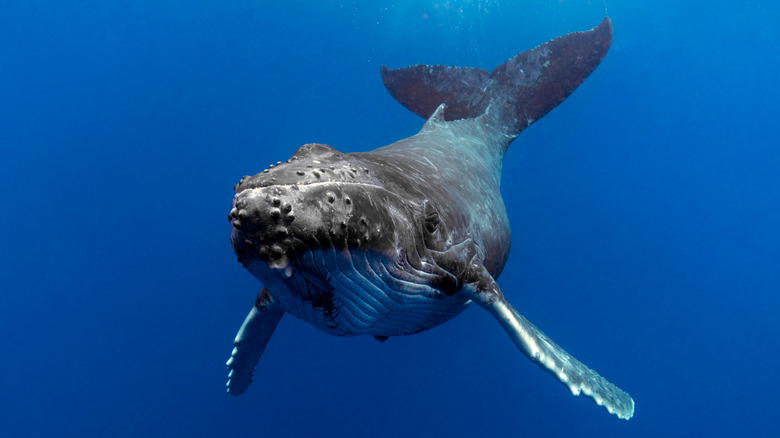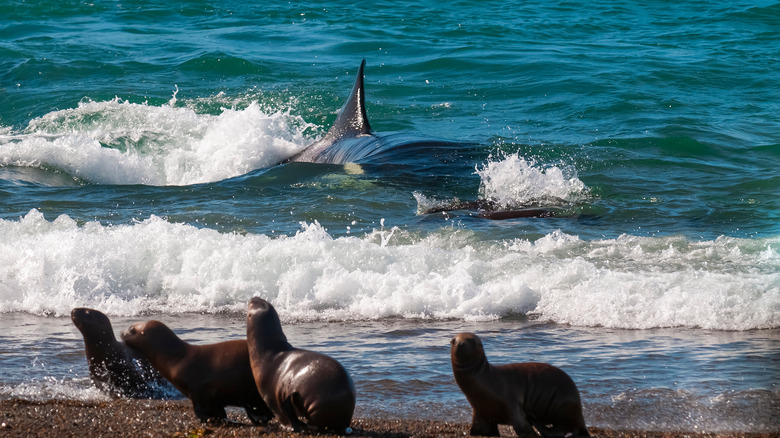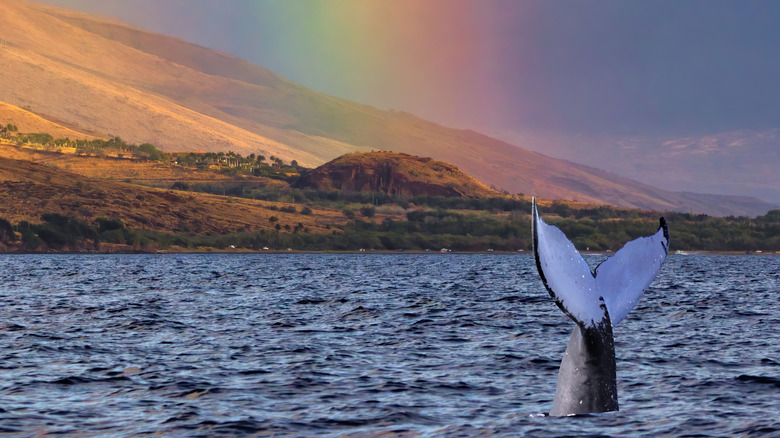The Surprising Reason Scientists Think Humpback Whales May Be Altruistic
Orcas have long been known to hunt whales' calves. In fact, according to Whale and Dolphin Conservation or WDC, ancient sailors originally referred to them as "whale killers" because they often saw orca's go on the attack to wrangle juvenile whales away from large whale species. Though the name got flipped, orcas (sometimes called killer whales) are not actually whales at all, rather they are the largest members of the dolphin family.
Killer whales have long viewed humpback whale calves as part of a balanced diet. In turn, according to Smithsonian Magazine, humpback whales seem to consider orcas their nemeses. Humpbacks stand at the ready to not only protect their own young, but according to a study published in the journal Marine Mammal Science in July 2016, there are at least 115 scientifically reviewed instances in which a humpback whale has been seen intervening when orcas hunt, and 89% of their intended prey were species other than humpback whales. It's almost like after millions of years sharing the vast oceans, orcas are on humpback whales' last nerve so they interrupt their dinner out of spite. Or is it because they have an instinct to protect other sea creatures?
The study reported that humpback whales are "known to intervene with attacking killer whales," but what's not clear is why they do that, or whether it proves that there is altruism — the act of doing good or sacrificing for another living thing though it is not beneficial to oneself — in the animal world?
Maybe humpbacks save seals because they're so cute
Robert Pitman, a marine ecologist with the U.S. National Oceanic and Atmospheric Administration, saw one such instance himself in 2009. He told Smithsonian Magazine that he saw a seal swim toward two humpback whales when it was being attacked by a group of orcas. The humpback whales had already gotten involved by that time and used their huge size to physically protect the seal by putting it on one of their chests and holding it up out of the water. When the seal started to slip, the whale nudged it back up onto its chest with its flipper, protecting the seal until it had a chance to make a break for the safety of an ice flow.
"That incident convinced me on the spot," Pitman told Smithsonian Magazine. "Those humpbacks were doing something that we couldn't explain with what we knew at the time about humpbacks and killer whales."
It's theorized that the unusual behavior may stem from generalized antipredator behavior, meaning that humpbacks have developed a disdain for orcas due to their attempts on their calves lives, and perhaps even on their own lives when they were calves, Smithsonian Magazine posits. Alternately, humpback bulls are also known to like to fight with each other, so maybe they are just taking some aggression out on orcas for fun.
The reason for the phenomenon is hard to know for sure
Pitman, an author of the previously mentioned study, called "Humpback whales interfering when mammal-eating killer whales attack other species: Mobbing behavior and interspecific altruism?", told Science Magazine that he thinks maybe humpback whales simply are hard-wired to intervene anytime they hear a killer whale go on the attack. When they swim towards orcas while they're actively hunting and it turns out the prey is a different kind of whale or a whole other species, they don't just hang it up. They stay. They fight. Sometimes for hours, without breaks, without food, and with no real benefit to themselves.
Pitman said, "I think they just have a simple rule. When you hear a killer whale attack, go break it up."
Fred Sharpe, a humpback whale researcher with the Alaska Whale Foundation said regardless of the motivations for the humpback whales behavior toward orcas, it's still fascinating and worth being studied.
He told Smithsonian Magazine, "It's easy to get lost in the nuance and to come up with high standards of how you interpret this behavior," Sharpe said. "But the fact is you have seals on the bellies of humpbacks. You know, it's just a really cool phenomenon and that's reason enough."


